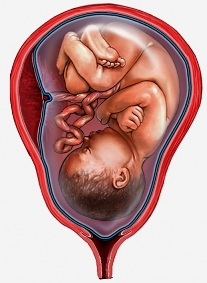Premature rupture of the membranes (PROM) is the condition when the amniotic sac breaks down and the water surrounding your baby starts leaking.
This condition occurs either at the end of the pregnancy or earlier, well before your due date.
When it occurs near the end, i.e. when you are over 37 weeks pregnant or term, then it is known as PROM.
However, it is still considered as preterm because the contractions have not begun. 10% of all pregnancies will be affected with PROM.
 Before 37 weeks of gestation, this occurs in about 2% of pregnancies. This condition is called pre-term premature rupture of membranes (PPROM).
Before 37 weeks of gestation, this occurs in about 2% of pregnancies. This condition is called pre-term premature rupture of membranes (PPROM).
Main reasons for PROM
Usually, rupturing of the membranes near the end of pregnancy or term can be caused due to natural weakening of the membranes or from the force of contractions.
Before the term, PROM happens due to an infection in your uterus. Some other conditions that lead to PROM include:
- Vaginal bleeding
- Low socioeconomic circumstances – Women under these conditions are less likely to get proper prenatal care
- Cigarette smoking during the pregnancy period
- Have had preterm birth in previous pregnancy
- Sexually transmitted diseases such as Gonorrhea and Chlamydia
- Pregnant women with low body mass index
- Excess amniotic fluid
- Multiple pregnancies previous to the current pregnancy
- Babies in breech position
- Undergoing any procedure like amniocentesis test and cervical cerclage
- Various unknown causes
Complications associated with premature rupture of membranes
- PROM is very problematic in as many as one third of premature births.
- The most significant risk factor associated with PPROM is there is high chance for the baby to born within a week of membrane rupturing.
- PROM can lead to miscarriage.
- Also, PROM leads to develop a serious infection of the placental tissues called as chorioamnionitis. This is a most dangerous condition for both you and your baby.
- Placental abruption is also a risk associated with PROM.
- Some other complications associated with PROM include: cesarean birth, umbilical cord compression and infections after the delivery.
Recognizing PROM
PROM can be recognized with your complete medical history or physical examination. The procedures used to recognize PROM include:
- Cervical examination – This shows if any fluid leaking from the opening of the cervix.
- By examining the pH nature of the fluid i.e. acidic or alkaline
- By observing the dried fluid under microscope
- Advanced ultrasound – This helps to know the functioning of internal organs and to assess the blood flow through various blood vessels.
Managing PROM
- In most cases, premature rupture of membranes can be treated with antibiotics. Studies showed that when antibiotics are used, your pregnancy is prolonged.
- If PROM happens during late pregnancy, then labor is induced to prevent the risk of infections.
- Steroids are another choice for treating PROM. Steroids help to mature the fetus’s lungs in cases when preterm birth cannot be prevented.
Whenever you notice any leakage from the vagina, immediately contact your healthcare provider for both yours and your baby’s safety.







Hi! I am 17 weeks pregnant and experienced vaginal bleeding two days ago. I found out that one of mt twins amniotic sacs burst. The doctor said there s a great chance at loosing both- one of them-and infection. So far both babies has strong heart beats and no sign of infection. Ultrasound will be repeated this morning to make sure there is two placentas instead of one. My high risk doctor is not going to rush anything as long as there is still two beating hearts. Is anything else that can be done differently?
My water broke at 17 weeks and I was left with only 1.2 cm of fluid. I have had lots of fluid loss and blood loss within the next 10 weeks. I am now at 28 weeks and still only have about 2.2 cm of fluid. However the baby has a strong heartbeat and is growing fine and appears that the kidney’s are OK with no infection. I’ve had steriod shots and will be going for an advanced ultrasound next week. What else can be done at this stage?